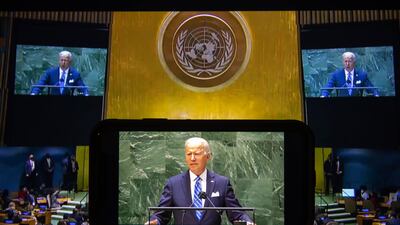Follow for live UN General Assembly coverage
Joe Biden's first presidential address to the UN General Assembly on Tuesday took a very different tone compared with the bombastic and isolationist speeches of former president Donald Trump.
Throughout his presidency, Mr Trump was deeply critical of the UN, whereas Mr Biden this week proclaimed support for the global body and its various missions.
Here are some differences between the two US leaders in their UN General Assembly speeches.
'America First' vs global unity
Mr Trump notoriously touted his “America First” agenda throughout his presidency and retreated from the global stage to refocus his efforts solely on the US.
“As president, I have rejected the failed approaches of the past, and I am proudly putting America first, just as you should be putting your countries first. That’s OK — that’s what you should be doing,” Mr Trump said in his 2020 UNGA address.
Mr Biden, however, emphasised partnerships and unity over isolation.
“We will not go it alone,” he declared.
“We will lead together with our allies and partners and in co-operation with all those who believe, as we do, that this is within our power to meet these challenges, to build a future that lifts all of our people and preserves this planet.”
Mr Biden later said countries should rise above conflict to address larger “borderless” problems the world shares.
“The United States is ready to work with any nation that steps up and pursues peaceful resolution to shared challenges,” he added.
“Even if we have intense disagreements in other areas — because we’ll all suffer the consequences of our failure if we do not come together to address the urgent threats like Covid-19 and climate change or enduring threats like nuclear proliferation.”
Might vs right
When it comes down to military force, the two presidents could not be more different.
“America is fulfilling our destiny as peacemaker, but it is peace through strength,” Mr Trump said in 2020.
“We are stronger now than ever before. Our weapons are at an advanced level like we’ve never had before — like, frankly, we’ve never even thought of having before. And I only pray to God that we never have to use them.”
Mr Biden took a different turn in 2021, promising “relentless diplomacy” and stating that “US military power must be our tool of last resort, not our first".
He also referenced the US withdrawal from the two-decade war in Afghanistan.
“I stand here today, for the first time in 20 years, with the United States not at war. We’ve turned the page,” he claimed, while the US continues drone and air strikes in Afghanistan and elsewhere.
Pandemic blame game
When it comes to overall empathy during a global pandemic, Mr Trump and Mr Biden, again, have two different approaches.
In 2020, Mr Trump pointed the finger at China for the spreading of Covid-19, repeatedly calling the it “the China virus”, which lead to an increase in violence against Asian Americans.
Though he made mention of the “countless lives” lost to Covid, Mr Trump didn't mention the collective grief the world is experiencing, as Mr Biden did on Tuesday.
The current president used the platform not blame one nation, instead pushing for unity to address the pandemic and prevent any future variants or pandemics.
A tale of two cities
Mr Trump left the Paris Climate Accord in 2017 and used the word “climate” only once in his 2020 remarks, blaming China for the world's environmental woes.
Meanwhile, Mr Biden said “climate” 14 times as he made it clear the US was back in the global fight against climate change.
This includes a return to the Paris Agreement and the Biden administration's pledge of $100 billion in funds for developing nations to mitigate climate change.
Regarding Iran
The two US leaders struck similar tones on Iran and the country's development of nuclear weapons.
Mr Trump namechecked Iran in his 2019 remarks more often than Mr Biden did on Tuesday; however, their approaches towards the nuclear deal with Tehran are decidedly different.
Mr Trump had the US leave the Iran nuclear deal while Mr Biden is trying to get back to the table.
China chill factor
Mr Trump mentioned China 11 times in his 2020 UN General Assembly speech, while Mr Biden didn't mention the country once in spite of the growing chill between the two nations.
“We’re not seeking - I’ll say it again - we are not seeking a new Cold War or a world divided into rigid blocs,” Mr Biden said in an apparent reference to Beijing.












